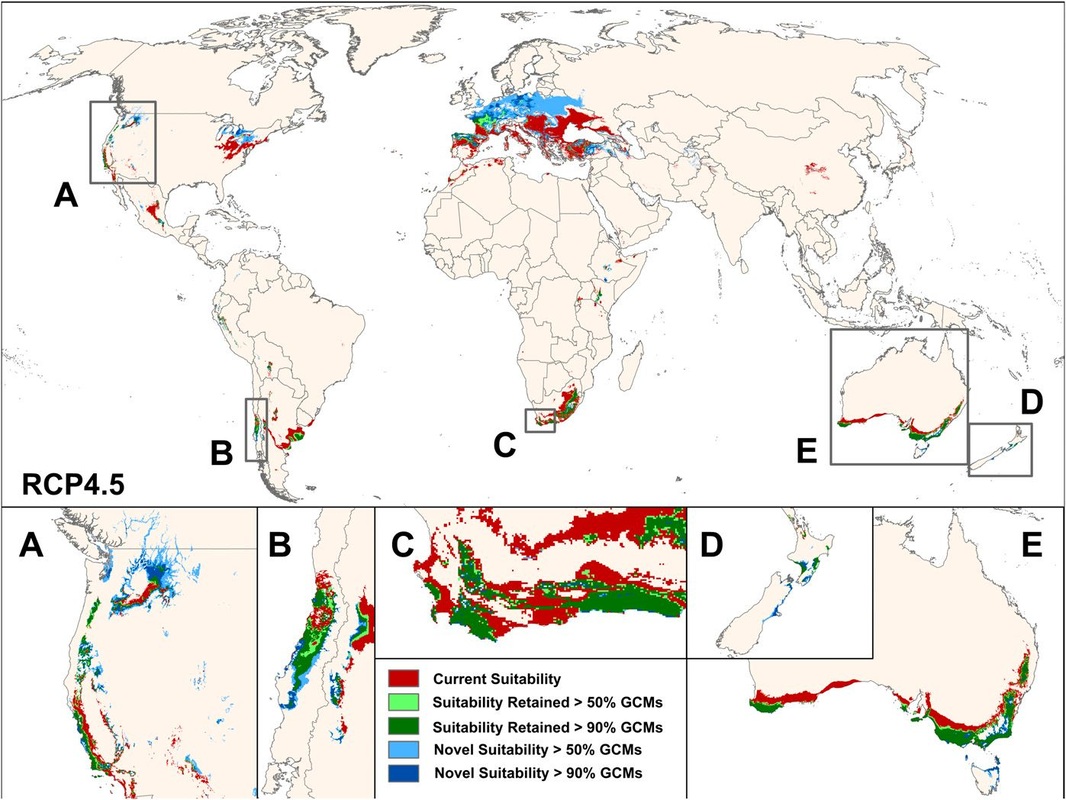April 2013In April 2013 verschenen er plotseling in alle Belgische en Nederlandse kranten stukken over de zich naar het noorden verplaatsende wijnbouw. De studie die hiertoe aanleiding gaf staat hier...........
|
Enkele citaten uit wetenschappelijke studies:
“De klimaatverandering kan leiden tot te veel suiker en te weinig zuren in wijn.”
SENATE - COMMISSION FOR ECONOMIC AFFAIRS, L’avenir de la viticulture française : entre tradition et défi du Nouveau Monde (The future of French wine production: in between tradition and the challenge of the New World), Information Report no. 349, 2001-2002, 141 pages
“De Pinot Noir druif heeft in de Bourgogne de grenzen bereikt wat betreft aanpassing voor het voortbrengen van fijne en elegante wijnen; hij heeft weinig kans nog in staat te zijn op de traditionele terroir waar hij nu is aangeplant zijn volledige eigenschappen en complexiteit aan aroma’s te ontplooien als de temperatuur blijft stijgen”.
Pichery M-C, BOURDON F. Éléments de réflexion sur quelques impacts économiques du réchauffement climatique sur la filière vitivinicole en Bourgogne. (Elements for
reflecting on some economic impacts of global warming on the wine production industry in Burgundy) Seminar:“Réchauffement climatique, quels impacts probables
sur les vignobles?” (“Global warming, what will the probable impact be on vineyards?”), 28-30 March 2007.
“In 2000, some red wines (Pinot Noir) from the Côte de Beaune area had characteristics typical of the wines from the Côtes du Rhône area.”
Chabin J-P and coll. La vigne et le réchauffement climatique : quel présent, quel futur ? Université de Bourgogne – Centre for climatology, 2008, 345 pages.
“(De klimaatverandering) kan er toe leiden dat de Pinot Noir verdwijnt uit de Côte de Beaune, en wordt vervangen door andere variëteiten.”
CHABIN J P, MADELIN M, BONNEFOY C. Les vignobles beaunois face au réchauffement climatique. (Vineyards of Beaune in the face of global warming)
Seminar: “Réchauffement climatique, quels impacts probables sur les vignobles?”, 28-30 Mars 2007.
https://www.u-bourgogne.fr/chaireunesco-vinetculture/Actes%20clima/Actes/Article_Pdf/Chabin.pdf
"La syrah pourrait-elle être une candidate d’intérêt pour une partie de la viticulture bourguignonne ? Les terres et un climat modifié seraient-ils à même de permettre de produire des vins de qualité avec de nouveaux cépages et de nouvelles typicités ?"
PICHERY M-C, BOURDON F. Réchauffement climatique, quels impacts probables sur les vignobles, Université de Bourgogne, 28-30 Mars 2007.
http://chaireunesco-vinetculture.u-bourgogne.fr/Actes%20clima/Actes/Article_Pdf/Pichery.pdf
“Malgré la prégnance du fait naturel, il est évident que nous sommes en face d’un système intégrant la dimension socio-économique.”
CHABIN J P, MADELIN M, BONNEFOY C. Les vignobles beaunois face au réchauffement climatique. Seminar: “Réchauffement climatique, quels impacts probables sur les vignobles?”, 28-30 Mars 2007.
https://www.u-bourgogne.fr/chaireunesco-vinetculture/Actes%20clima/Actes/Article_Pdf/Chabin.pdf
“The average annual temperature has significantly increased in the (Burgundy) region over the last years, leading to major shifts in the wine production calendar. Some wines have already lost elements of their specific personality: they are marked by higher alcohol strengths and sugar content. These changes put France’s ‘wine producing pedigree’ at risk. Great French wines derive all their finesse and elegance from their terroir.”
“Changements climatiques et impacts sur la viticulture en France ”September 2009 Greenpeace France
Als de Bourgogne te warm wordt voor de Pinot Noir. Waar past hij dan wel?
Als het in de Bourgogne te warm wordt voor de Pinot Noir zal deze een nieuw thuis vinden in het koelere noorden. Bij ons dus. Meer ..........................
Click here to edit.

